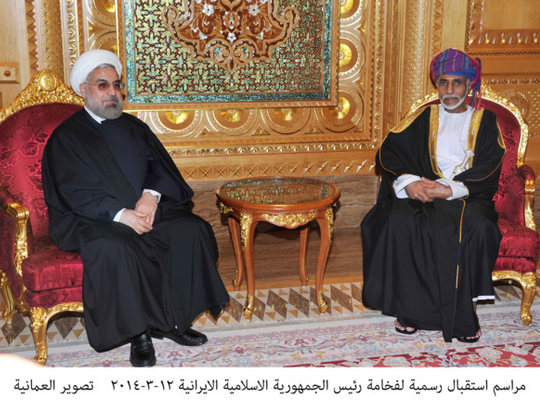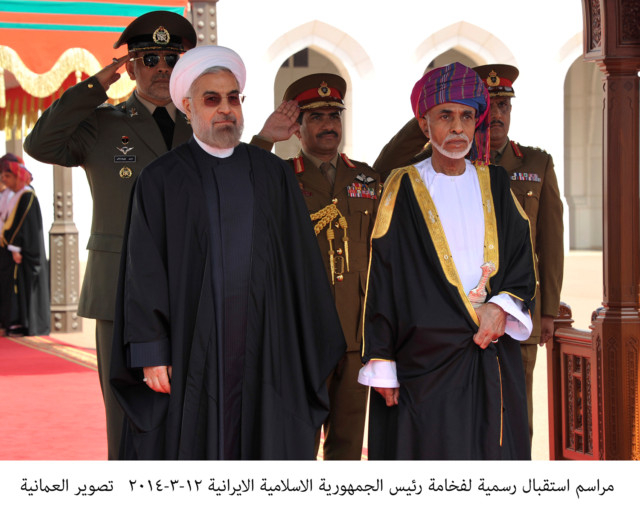
Muscat: Iranian President Hassan Rouhani held talks in Muscat with Sultan Qaboos Wednesday as he kicked off a two-day Oman visit aimed at boosting economic ties between the longtime allies.
Rouhani went into the meeting with Sultan Qaboos, who has acted as an intermediary between Western countries and the Islamic republic, soon after he arrived in Muscat accompanied by a delegation of Iranian leaders.
The two leaders discussed “bilateral cooperation” and “building good relations” between their countries, Oman’s official ONA news agency reported.
Rouhani was greeted on arrival at the royal airport in Muscat by Oman’s deputy prime minister for the council of ministers, Fahd Bin Mahmoud Al Said, the Oman News Agency reported.
The sultanate is reported to have hosted secret talks between Iran and the United States ahead of the signing in Geneva last November of an accord between world powers and Iran on its nuclear programme.
A government official said Rouhani was also to hold talks on Wednesday with senior Omani officials, the sultanate’s top cleric Ahmad Al Khalil and local business people.
Before departing Tehran with a delegation of Iranian ministers for the two-day visit, Rouhani hailed the “good relations” that exist between Tehran and Muscat.
“During this trip, we want to implement contracts (signed) in the field of trade and economy, especially those linked to oil and gas,” as well as in finance, banking, and culture, he told reporters at the airport, as cited by the official Irna news agency.
“This visit is of great importance to strengthen relations between Iran and Islamic countries, especially those neighbouring Iran,” he added.
“The Strait of Hormuz gives countries south of the [Arabian] Gulf and the Arabian Sea great importance,” Rouhani said.
Iran’s elite Revolutionary Guards is in charge of protecting the strategic strait, at the entrance to the Gulf, a key gateway for the world’s oil supplies.
Tehran’s ambassador in Muscat, Ali Akbar Sibeveih, said ahead of the visit that Oman and Iran are seeking to expand trade, which reached $1 billion last year, as well as bilateral investments which they expect will top $10 billion by the end of this year.
Iran and Oman signed an agreement in 2009 for the construction of a 200-kilometre undersea gas pipeline linking the two countries.
Oil Minister Bijan Zanganeh, accompanying Rouhani, voiced hope that the project would be finalised “during the visit”.
Iran is planning to invest $4 billion in Oman’s Duqm port on the Arabian Sea, in projects that include the establishment of 100 large oil and gas tanks and an iron-smelting plant, among other projects.
It will invest a further $2 billion in two other ports - Sohar and Salalah, according to Sibeveih.
Meanwhile, Oman will invest in petrochemical, education, and oil exploitation projects in Iran worth $4 billion.
Over the past year, the United States has gradually strengthened its naval forces in the Gulf region, particularly after Iran at one point threatened to block the strait.
Rouhani’s visit comes against a backdrop of mounting internal tension among members of the Gulf Cooperation Council, which includes Oman, after Saudi Arabia, the UAE and Bahrain withdrew their ambassadors from Doha, accusing it of meddling in their internal affairs and backing Islamists.
Tehran enjoys good relations with Muscat but is locked in a decades-long rivalry with Saudi Arabia while other Gulf states are wary of the ambitions of their neighbour across the water.
Rouhani is the second Iranian leader to visit Oman since the 1979 Islamic Revolution. His hardline predecessor Mahmoud Ahmadinejad visited the sultanate in 2007.
Sultan Qaboos traveled to Tehran in August, becoming the first foreign leader to visit Rouhani since he took office. On that visit, he said his country was prepared to develop trade routes through Iran between Oman and Central Asian countries such as Turkmenistan and Uzbekistan.
Rouhani’s trip follows a visit by Iranian Foreign Minister Mohammad Javad Zarif to several Gulf states, including Oman, in December. Senior Iranian leaders have yet to visit Gulf heavyweight Saudi Arabia.
Rouhani’s delegation includes Mohammad Jawad Zarif, minister of Foreign Affairs, Bijan Namdar Zanganeh, minister of Oil, Abbas Akhoundi, minister of Road and Urban Development, Ali Rabie, minister of Cooperatives, Labour and Social Welfare, Mohammad Nahavandian, head of the Presidential Office, Hussain Fredoun, special assistant to the President for Executive Affairs, Masoud Soltanifar, vice-president and head of the Cultural Heritage, Tourism and Handicrafts Organisation (CHTHO), Masuma Ibtikar, vice-president and head of the Environment Protection Organisation, Waliullah Saif, chairman of the Central Bank, Ali Akbar Sibeveih, ambassador of the Islamic Republic of Iran to the Sultanate, Hussain Amir, deputy foreign minister for Arab and African Affairs and a number of Iranian officials.
—- With inputs from AFP, ONA and AP












